|
Update
for Friday, 29 June:
Delegates
met in an afternoon and an evening Plenary for a report
on the progress of the negotiations. Committee of the Whole
(COW) Chair Francis Montanaro Mifsud (Malta) presented the
COW's report on institutional provisions and CGRFA Chair
Gerbasi (Venezuela) presented his proposed compromise text
on Articles 11-13. Delegates considered these texts article
by article, as well as the use of terms, submitted by the
informal working group. In the morning, informal consultations
of the working group on Article 15 (ex situ collections),
and the "Friends of the Chair" contact group took
place, while a working group on the sessions' resolutions
was established and met in the afternoon.
Plenary
- Initial statements and debate on list of crops
|
 The
NETHERLANDS, on behalf of the EUROPEAN REGION expressed concern
over the state of negotiations on the list of crops under
the MS. He highlighted lack of progress, illustrated by the
exclusion of soya bean, groundnut, tomato, and of the wild
relatives of maize, wheat and potato, which are essential
for breeding. He noted some regions' wish to exclude from
the list any crops or wild relatives for which their region
is an important centre of origin. The
NETHERLANDS, on behalf of the EUROPEAN REGION expressed concern
over the state of negotiations on the list of crops under
the MS. He highlighted lack of progress, illustrated by the
exclusion of soya bean, groundnut, tomato, and of the wild
relatives of maize, wheat and potato, which are essential
for breeding. He noted some regions' wish to exclude from
the list any crops or wild relatives for which their region
is an important centre of origin. |
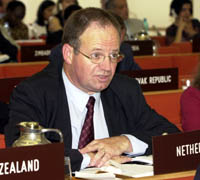 |
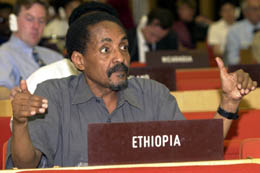 |
 ETHIOPIA,
on behalf of the AFRICAN GROUP stressed that developing
countries are expected to make their resources available bearing
additional burden and receiving fairly negligible benefits.
He underscored that resolution of negotiations on the list
of crops depends on resolution of other issues as well. ETHIOPIA,
on behalf of the AFRICAN GROUP stressed that developing
countries are expected to make their resources available bearing
additional burden and receiving fairly negligible benefits.
He underscored that resolution of negotiations on the list
of crops depends on resolution of other issues as well. |
|
 VENEZUELA,
on behalf of GRULAC, said their region is willing to
include important species for food security, will consider
each crop separately, and for some crops different species;
however, technically there is no reason to include all crops. VENEZUELA,
on behalf of GRULAC, said their region is willing to
include important species for food security, will consider
each crop separately, and for some crops different species;
however, technically there is no reason to include all crops.
|
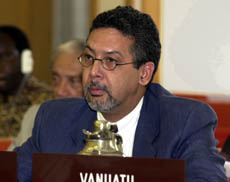 |
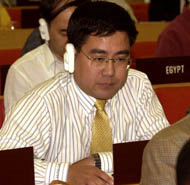 |
 CHINA
drew attention to the specific situation of soya bean. CHINA
drew attention to the specific situation of soya bean. |
 Brazil
called for a holistic view of the task at hand, and said
he wanted the same language use in provisions for access as
for those regarding benefit-sharing. Brazil
called for a holistic view of the task at hand, and said
he wanted the same language use in provisions for access as
for those regarding benefit-sharing. |
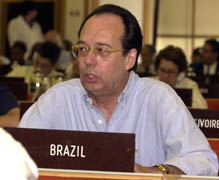 |
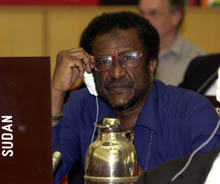 |
 SUDAN,
on behalf of NEAR EAST said they would defend the interests
of developing countries. SUDAN,
on behalf of NEAR EAST said they would defend the interests
of developing countries. |
 CUBA,
on behalf of G77/China, said they have shown willingness
to resolve issues, and would continue to do so in a spirit
of good will and in the interest of food security. CUBA,
on behalf of G77/China, said they have shown willingness
to resolve issues, and would continue to do so in a spirit
of good will and in the interest of food security. |
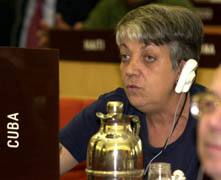 |
|
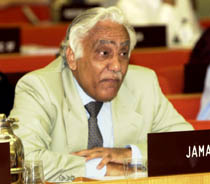
|
JAMAICA
stated that his government was against "littering this
agreement with the words 'by consensus'", fearing that
too many requirement for consensus would make the agreement
unworkable. |
| Plenary
- Report of the COW |
|
|

|
|
 COW Chair Francis Montanaro Mifsud (Malta) presented the
Committee's work. He said
COW Chair Francis Montanaro Mifsud (Malta) presented the
Committee's work. He said
the COW had completed reviewing Articles 19-32 on institutional
and legal aspects, and noted
outstanding issues related to: the use of consensus only
or a two-thirds majority vote as a last
resort at decision making; and issues linked to the pending
decision on the IU's legal basis, either
as an FAO Article XIV subsidiary body or otherwise.
Above
and below, from left to right: Jose Esquinas-Alcazar,
CGRFA Secretary; Fernando Gerbasi (Venezuela), Chair of
the CGRFA; and Chair Francis Montanaro Mifsud (Malta), Chair
of the COW.
|
 |
| Plenary
- Debate on amendments, Articles 19.2(h) and (i) |
|
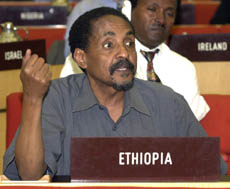
|
 Ethiopia
stated that the insistence on consensus amounted to ensuring
a right of veto, and said that if there is to be a veto
on anything relating to benefits, then there must also be
the same right regarding access of r the providers of genetic
resources. "I am saying this very seriously... if the
system we are creating is not good to all of us, we don't
want it." Ethiopia
stated that the insistence on consensus amounted to ensuring
a right of veto, and said that if there is to be a veto
on anything relating to benefits, then there must also be
the same right regarding access of r the providers of genetic
resources. "I am saying this very seriously... if the
system we are creating is not good to all of us, we don't
want it."
|
|
In
the corridors...
|
|
| 10:15
pm, in the Nordic Lounge just outside the Red Room where Plenary
was still meeting: participants catching a break, and
a bite to eat, when and where they can. |
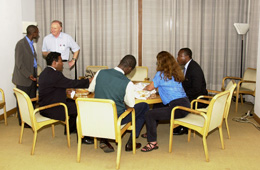 |
|
Side-event
- farmer's rights
|
|
 More
than 80 delegates and FAO staff attended an NGO lunchtime
meeting, hosted by IATP and chaired by ITDG, entitled "[in
the form] received": implications of Global IPR systems
at the farm level" More
than 80 delegates and FAO staff attended an NGO lunchtime
meeting, hosted by IATP and chaired by ITDG, entitled "[in
the form] received": implications of Global IPR systems
at the farm level"
Keynote
speaker Percy Schmeiser
(on the left) is a Canadian farmer who is the victim
of Monsanto's contamination of his fields and crops by roundup-ready
canola (oil seed rape) plants planted in adjacent fields.
This modified canola has spread involuntarily into his fields,
but Monsanto claim that they own his crops because their
intellectual property is contained in them. As a consequence,
they claim his crop and all profits from it. He is appealing
a decision by the Canadian courts that he is guilty of patent
infringement. The discussion raised important issues of
direct relevance to the IU negotiations and Farmers' Rights.
Patrick
Mulvany, ITDG, updated
delegates on the NGO's perspective of the progress of the
IU negotiations, summarised in Friday's pessimistic
press release circulated to delegates. He urged delegates
to negotiate constructively to achieve a just, equitable
and comprehensive IU. He emphasised the importance of these
negotiations and the wider programme of work on agricultural
biodiversity, managed by FAO, to food security and livelihoods.
|